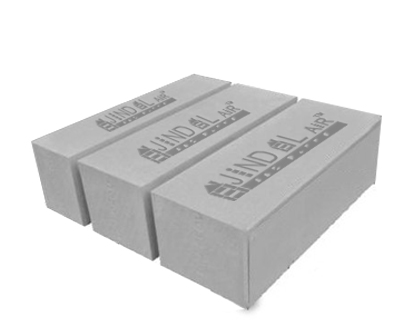We offer
Jindal Air AAC is a strong and quality-conscious corporate having sound foundation in the area of infrastructure development and providing quality green building product along with value pricing.

JINDAL AIR AAC Blocks
JINDAL AIR AAC Blocks is a viable replacement for conventional red clay bricks, which we normally use for our building construction. Red clay bricks are used for load bearing as well as for filler walls of RCC frames in high rise structures. There is considerable difficulty, of late in getting good quality bricks. In addition manufacture of bricks cause depletion of top soil and is considered environmentally unfriendly.
Talk more about your products here.
Tell prospective customers more about your company and the services you offer here. Replace this image with one more fitting to your business.
Advantage JINDAL AIR AAC Blocks
Quality

Light Weight
Jindal Air AAC Blocks are 3 times lighter than bricks.

Assured quality
Jindal Air AAC Blocks are made in fully automatic plant under strict quality parameters

Pets&Termite Resistant
Jindal Air AAC Blocks are pest and termite resistant due to the inorganic nature.

Fire Resistant
Jindal Air AAC Blocks are non-combustible and have melting point of approximately 1500`c. Thus fire resistance is 3 times more (4-6 Hours for 200mm thick wall) than conventional bricks.

Earthquake Resistant
Because of reduction in self weight, AAC block construction attracts, Less earthquake load. The light weight property of the AAC blocks results into higher steadiness of the AAC blocks in the structure of the buildings.

Eco-Friendly
The raw materials used for the production, Has been found to be eco-friendly. The use of fly ash in this venture, makes us to utilize a waste material from thermal plants.AAC is a non-toxic product which does not pollute the air, land or water.

Sound Insulation
The AAC Block has better sound insulation properties, Due to its air voids presence.The porous structure of the AAC blocks results into enhanced sound absorption.

Cost-Effective
The AAC Block, When built has both faces as fair faces, Unlike brick work, Which has only one face as a fair face? Hence if plastered, The thickness of PlasterforAAC block is much less compared to conventional bricks.

Moisture Resistance
Moisture from both external and internal sources can cause damage to buildings; therefore, moisture protection is a primary consideration. External moisture sources include rain and water from the soil.
Technical Specifications
| Parameters | Specifications |
|---|---|
| Density Oven Dry | 550-650 kg/m3 |
| 550-650 kg/m3 | 4N/mm2 (MPa) |
| Shear Strength | 0.6 N/m2 |
| Modulus of Elasticity | 2040 Mpa |
| Coefficient of Thermal Expansion | 8.1 x 10 -6 K -1 |
| Water Absorption | 8% |
| Thermal Conductivity | 0.16 w/moK |
| Thermal resistance | 0.46 m2 - 0k/w |
| Drying Shrinkage | 0.04% |
| Fire resistance | 4 Hrs (for 200 mm wall) |
| Sound Transmission class rating | 44db for 200 mm wall |
| Method Statement | Download |
